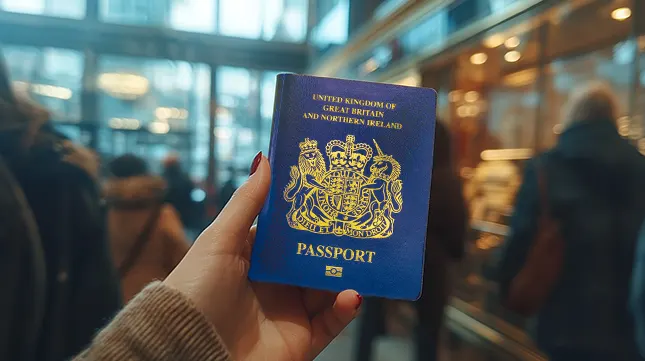Repatriating to UK – 2025 Expats Returning Guide

Moving back to the UK after living abroad is an exciting prospect.
Whether you’ve spent years in another country or only a short while, returning home means navigating new changes, reconnecting with family, and re-establishing your life.
There are many reasons why expats return home to the UK, but the real benefits of repatriation often lie in the comfort of returning to familiar surroundings, where you understand the language, culture, and lifestyle.
For expats with families, the UK’s well-regarded school system and extensive public services are significant advantages.
For others, most in fact, reconnecting with old friends and family and re-establishing a career in one of the world’s most diverse job markets can be just what they need.
Beyond the logistics, returning to the UK allows you to re-engage with British culture, from traditional pubs and historic landmarks to the serenity of the countryside.
As you prepare to return, it’s crucial to stay informed about recent changes.
The UK continues to adapt its laws, social policies, and economic landscape, making it crucial to stay informed.
Our guide will take you through everything you need to know for a smooth return to the UK, ensuring that your transition is stress-free and filled with optimism.
Key Considerations Ahead of Your Return

There are some vital things to keep in mind before repatriating.
Life circumstances can change and spark the decision to return.
Perhaps you’ve built global expertise that you want to leverage in the UK job market.
With remote work options expanding, it’s also become easier for returning expats to maintain international connections while living on home soil.
However, planning is essential. If you’ve been gone for an extended period, research your immigration status before booking your flight.
Give yourself ample time to handle logistical tasks like transferring healthcare records and closing overseas bank accounts.
If you have children, explore local schools and application deadlines early (more on that later).
Beyond that, remember to reconnect with the British social security system, known as National Insurance.
Visit the GOV.UK website to learn how to keep your contributions updated and ensure you don’t miss any entitlements.
In fact, the Government website is a mine of very useful information for those returning to the UK.
Family Visas: Ensuring a Smooth Return to the UK

Family visas are a great option for many people coming to the UK.
Before you consider coming home, you must get your visas in place.
If you’re planning to return to the UK and have family settled there, reuniting could be easier than you think.
Family visas are available for those with close relatives in the UK.
These visas allow you to travel with spouses, parents, or even children under specific categories.
The type of visa you’ll need depends on your relationship with the family member you’re joining, so it’s crucial to apply for the correct one.
For instance, spouses and partners can apply for a visa to live in the UK with their significant other, while children and dependent relatives have their own tailored options.
Each visa type has its own set of requirements, and most family permits are initially valid for 2.5 years.
Remember that any major life changes, such as marriage or a new relationship status, may require you to apply for a different visa to maintain your legal status.
For full details, visit the UK government’s official immigration site at GOV.UK.
Finding A Home in the UK

Its important to have a good idea of what the housing market in the UK is doing before your move.
The housing market in the UK has experienced significant changes, especially after Brexit, when prices reached record levels.
Thankfully, this situation has calmed, and although values continue to rise, they are not increasing as fast.
Whether you’re looking to rent or buy, familiarising yourself with the property landscape is key.
Returning expats should assess different regions to find the best fit for their families.
London, for example, offers many job opportunities, world-class schools, and a multicultural lifestyle.
Conversely, rural areas like the Cotswolds or Lake District might appeal to those seeking a quieter life with stunning landscapes.
Useful tools like Rightmove and Zoopla will help you explore properties across the UK.
Some things don’t change, so be prepared for higher prices in urban centres like London and most large cities, while areas in northern regions offer more affordable options.
To give you an idea of the likely cost of a home, here is a table indicating the average cost to buy a home depending on location:
- East Midlands £249,000
- East of England £341,000
- London £521,000
- North East £165,000
- North West £220,000
- South East £381,000
- South West £320,000
- West Midlands £254,000
- Yorkshire & £215,000
- the Humber
Stats as per the UK House Price Index for July 2024 (latest figures until July 2025)
Visit Rightmove to explore UK property prices and what to expect in 2025. They have produced a very informative housing market forecast.

Make sure you take the time to consider the process of finding a job in the UK.
One of the biggest concerns for expats returning to the UK is employment.
Whether you’re re-entering a familiar industry or looking to change careers, the UK job market offers a range of opportunities.
London remains a global hub for finance, technology, and creative industries.
Outside the capital, cities like Manchester, Leeds, and Bristol are growing rapidly, providing excellent prospects in tech, media, and education.
To get ahead, start your job search early.
Websites like LinkedIn, Indeed, and the increasingly popular Glassdoor can help you explore roles and connect with recruiters before you return.
For those seeking specialist roles, industry-specific platforms can offer tailored job listings.
It’s also worth considering that UK employers value the experience gained abroad, especially if you’ve developed language skills or worked in international markets.
Be sure to update your CV to reflect the experience you have garnered since you have been working away.
There are many websites where you can download templates and find tips and advice about updating your CV, and learn how to create a cover letter.
Here are a couple you can explore: LiveCareer and myperfectcv
Tax and Financial Planning for Returning Expats

Repatriating requires a good understanding of taxes and some good financial planning.
Returning to the UK means facing new financial responsibilities, particularly regarding taxes.
The UK tax system operates on a worldwide income basis, meaning you may be taxed on any earnings generated overseas.
To avoid any surprises, it’s essential to update yourself with current tax laws and possibly seek advice from a financial advisor experienced in expat tax issues.
For expats who have held property abroad, selling these assets and moving back to the UK can be complicated.
Consult the HMRC website for up-to-date guidance for returning residents on property sales and capital gains tax.
You might also need to adjust your pension arrangements or transfer savings, so seeking help from international financial services could smooth the process.
Healthcare: Re-Registering with the NHS

Ensure you register with the NHS.
One important job when repatriating to the UK is regaining access to the National Health Service (NHS).
For expats who have been used to paying for private healthcare abroad, returning to a system that offers free services at the point of use is a major relief.
However, you must register with a local GP when you return to the UK to ensure you’re covered.
Additionally, it’s important for those bringing children back to update their vaccinations according to the UK’s immunisation schedule.
Although the NHS remains a cornerstone of the UK, due to increasing demand and resource constraints, patients often face long waiting times for non-urgent treatments and can find it difficult to secure timely GP appointments.
While the NHS delivers essential care, it’s important to be aware of these delays and plan accordingly, possibly considering private healthcare options for faster access in certain cases.
Specialists and emergency services are accessible throughout the country, but waiting times for non-urgent treatment may vary depending on where you live.
Expats moving to cities like London may face longer waits than those in rural areas.
If you’re returning with pre-existing health conditions, consider supplemental private insurance to avoid delays in treatment.
A helpful website for returning expats looking to re-register for NHS services is the official NHS website.
It provides clear guidance on registering with a GP and accessing NHS services upon returning to the UK. You can visit this page for detailed instructions.
Education: Getting Your Children Settled in School

Those moving with children need to consider which school is the best fit for them.
For expats with families, one of the main priorities is finding the right school for your children.
The UK offers a mix of public and private education, with comprehensive schools, grammar schools, and academies.
Most returning expats look for schools that offer a smooth transition for their children, .
Researching schools through platforms like Ofsted and local government websites will help you make informed decisions.
If you’re moving to a major city, you may face fierce competition for spots at top-rated schools, so apply early.
Private schools may offer more flexibility in admissions, but they come with a significant price tag.
Expats should also be aware that the British education system may differ from other countries in terms of structure and assessment methods, so it’s worth preparing your children for this transition.
Changing countries, let alone schools, is a massive challenge for many children. It takes time and patience to reassure them that everything will be ok.
For some helpful, practical advice for preparing your child for your return, visit the Expat Child website.
It is full of helpful information for this situation.

Keep in mind that the cost of living has probably changed since you were last in the UK.
The UK is known for having a relatively high cost of living, and recent increases in everyday expenses have made budgeting even more essential.
If you plan to return to the UK, you should be prepared for the rising costs of housing, utilities, and groceries.
While the cost of living does vary across the country, with northern regions typically being more affordable than London and the South East, it’s still a significant factor in many areas.
Despite these expenses, one advantage is that UK salaries are generally higher than many European countries, often by as much as 70% in some cases.
This significant advantage can help offset the higher living costs, especially in major cities where job opportunities are more abundant.
For a detailed breakdown of living expenses across different regions, visit Numbeo for up-to-date information.
If you need any help or advice about how you can save, budget, and manage your finances upon your return, here are a few highly recommended resources:
- MoneySavingExpert – A comprehensive site offering tips on budgeting, saving, and cutting costs in all areas of life, from utilities to shopping.
- MoneyHelper – A government-backed site that provides free advice on creating a budget, managing savings, and planning for future expenses.
- Which? Money – Offers guidance on personal finance, including tips on saving, budgeting, and finding the best deals for everyday essentials.
Bringing Your Pet Back to the UK: What You Need to Know

Bringing a pet to the UK requires a good level of planning.
Repatriating to the UK with your pet involves careful planning to ensure a smooth transition.
Just like children, pets are easily stressed and anxious when their routine is disrupted.
Whether your pet is originally from the UK or acquired while living abroad, you must follow specific regulations.
To enter the UK, your pet must have a valid microchip, an up-to-date pet passport or health certificate, and proof of rabies vaccination.
Additionally, if you’re travelling with a dog, treating it for tapeworm between 24 and 120 hours before arriving in the UK is essential.
Different rules apply depending on the type of pet, so it’s important to check the latest guidelines.
If your pet doesn’t meet the necessary requirements, it may be quarantined for up to four months at a government-approved facility, which will cost money and cause more unnecessary upset for your beloved pet.
To avoid any issues, visit the official UK government site for up-to-date rules and guidance: UK Government – Pet Travel.
Plus, ExpatFocus has some very helpful information regarding the importation of pets to the UK.
By preparing ahead, you can ensure your furry friend’s return to the UK is as stress-free as possible.
Importing Your Belongings to the UK: A Guide to Hassle-Free Shipping

Using a reliable removals company can ensure your belongings arrive safely in the UK.
Bringing your belongings back to the UK requires careful planning to ensure everything goes smoothly.
The first step is deciding whether to ship all of your possessions or just the essentials.
Many expats choose to return with most of their belongings, and in that case, it’s important to work with a reputable international moving company.
Make sure the company you choose are members of professional organisations such as FIDI, BAR, or OMNI, as members of these groups meet rigorous standards and are regularly audited.
White & Company, for example, has long-standing relationships with trusted partners worldwide.
They can guide you through the export and import process and help with any necessary UK customs paperwork.
Before shipping, it’s important to have a surveyor assess your belongings to calculate shipment volume and provide a quote.
To avoid unexpected customs charges, make sure you’re familiar with UK customs regulations.
For more details on what you can and cannot import, visit the UK government’s customs website: UK Government – Customs Information.
By preparing ahead, you can ensure a smooth transition when importing your belongings.
Ready to Return to the UK? Let White & Company Handle Your Move

Are you repatriating to UK?
White & Company is here to make the process as smooth and stress-free as possible. With over 155 years of experience in international removals, we’ve earned a reputation as a trusted name in the industry.
As proud members of BAR, FIDI, and OMNI, we adhere to the highest standards, ensuring your belongings are in safe hands throughout the move.
Whether you’re bringing back delicate heirlooms or large, bulky items, our skilled teams across the UK are ready to expertly pack and prepare your possessions for transport.
We understand how important a seamless transition is, which is why we offer comprehensive support every step of the way.
To find out how we can help get your relocation started, contact us today or fill out a quick quote form on our website.
Visit White & Company for more information and start your journey home with confidence.

Max is a seasoned writer and blogger in the real estate and home moving sectors, as well as a knowledgeable source of information for expatriates living and working abroad. His detailed insights have helped thousands of people move and live abroad with greater simplicity and ease.
Posted in: News
Leave a Comment (0) ↓




